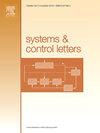Model-free predictive iterative learning safety-critical consensus control for multi-agent systems with randomly varying trial lengths
IF 2.1
3区 计算机科学
Q3 AUTOMATION & CONTROL SYSTEMS
引用次数: 0
Abstract
In this paper, a model-free predictive iterative learning control (MFPILC) is proposed for a class of nonlinear and nonaffine single-input multiple-output (SIMO) discrete-time multi-agent systems with randomly varying trial lengths, input time-varying delay and nonrepetitive external disturbances to deal with the safety-critical consensus control problem. First, the agent dynamics are transformed into a novel dynamic linearization data model along the iteration axis containing the upper and lower bound of the unknown input time delay with an unknown system parameter pseudo gradient (PG). A steepest-descent estimation algorithm updated along the iterative learning axis is applied to deal with the unknown PG and the unknown non-repetitive external disturbances. Further, the predictive compensation mechanisms are proposed to address the problem of data loss caused by the varying trial lengths at each iteration of the MASs. Therefore, a predictive iterative learning consensus control method is designed for MASs based on consensus error and data compensation mechanisms. Moreover, a new model-free predictive iterative learning safety-critical consensus control combined with a discrete-time iterative learning control barrier function (ILCBF) is presented to ensure the output safety of nonlinear MASs. Finally, simulation results further verify the effectiveness of the proposed method.
随机变化试验长度的多智能体系统无模型预测迭代学习安全关键共识控制
针对一类具有随机变试验长度、输入时变延迟和非重复外部干扰的非线性非仿射单输入多输出(SIMO)离散多智能体系统,提出了一种无模型预测迭代学习控制(MFPILC)来解决安全临界一致性控制问题。首先,将智能体动态转换成一个新的动态线性化数据模型,该模型沿迭代轴包含未知输入时延的上界和下界,并带有未知系统参数伪梯度(PG)。采用沿迭代学习轴更新的最陡下降估计算法来处理未知PG和未知非重复外部干扰。此外,提出了预测补偿机制,以解决每次迭代时由于试验长度的变化而导致的数据丢失问题。为此,设计了一种基于共识误差和数据补偿机制的预测迭代学习共识控制方法。此外,为了保证非线性质量的输出安全,提出了一种新的无模型预测迭代学习安全临界一致性控制与离散时间迭代学习控制障碍函数(ILCBF)相结合的方法。最后,仿真结果进一步验证了所提方法的有效性。
本文章由计算机程序翻译,如有差异,请以英文原文为准。
求助全文
约1分钟内获得全文
求助全文
来源期刊

Systems & Control Letters
工程技术-运筹学与管理科学
CiteScore
4.60
自引率
3.80%
发文量
144
审稿时长
6 months
期刊介绍:
Founded in 1981 by two of the pre-eminent control theorists, Roger Brockett and Jan Willems, Systems & Control Letters is one of the leading journals in the field of control theory. The aim of the journal is to allow dissemination of relatively concise but highly original contributions whose high initial quality enables a relatively rapid review process. All aspects of the fields of systems and control are covered, especially mathematically-oriented and theoretical papers that have a clear relevance to engineering, physical and biological sciences, and even economics. Application-oriented papers with sophisticated and rigorous mathematical elements are also welcome.
 求助内容:
求助内容: 应助结果提醒方式:
应助结果提醒方式:


